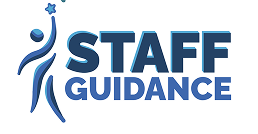77% of Professionals...
…say they’ve experienced burnout at work
Burnout increases risk of serious illness.
Chronic stress is linked to heart disease, high blood pressure, and Type 2 diabetes (Mayo Clinic, 2023).
Burnout doubles risk of depression and anxiety.
WHO classifies burnout as an “occupational phenomenon” that drives higher rates of depression, anxiety, and sleep problems (WHO, 2022).
Burnout impacts relationships.
Research shows burned-out employees report lower satisfaction in personal relationships and higher conflict at home (American Psychological Association, 2023).
Burnout isn’t just stress; it affects health, focus, and relationships.
Building in self-care prevents breakdown and supports long-term success.
How to Use the Digital Mind of Dr. Skinner
Take Self-Care Out of Theory and Put it to Practice!
Start a conversation with the Digital Mind of Dr. Skinner in your Staff Guidance app.
1. Click “Start a Conversation…”
…to go to Staff Guidance. Once in the app, you can chat with the Digital Mind by voice or by text, whichever you’d prefer
2. Describe Your Question or Situation
The more detail you provide, the more specific and personalized guidance you’ll receive
3. Start with Suggested Prompts
Look for “Ask Dr. Skinner” for suggested ways to start a conversation with the Digital Mind to improve your Self Care!
ASK DR. SKINNER:
“What self-care steps can I take when I’m starting to feel burnt out? Where do I start?”
Self-Care: Myth vs. Fact
You can’t run on empty. Self-care is how you recharge, refocus, and stay strong.
It’s not a luxury or an afterthought; it’s the edge that keeps you performing at your best.
Myth: There’s no time for self-care in a busy schedule.
Fact: Even 20 minutes outside can lower stress hormones and boost focus (Harvard Medical School).
Myth: Self-care is just about mental health.
Fact: Physical, emotional, and social habits all work together to strengthen resilience.
Myth: Self-care has to be perfect or consistent.
Fact: Small, imperfect efforts add up. Progress matters more than perfection.
Myth: Self-care means spa days and vacations.
Fact: Most effective self-care is simple: sleep, hydration, movement, and boundaries.
ASK DR. SKINNER:
“How can I balance self-care with all my other responsibilities without feeling overwhelmed?”
“Taking Care of Yourself Doesn’t
Mean 'Me First...'
…It Means ‘Me Too.’” -L.R. Knost
“Self-care is how you take your power back.”
– Lalah Delia
“Self-compassion is simply giving the same kindness to ourselves that we would give to others.”
– Christopher Germer
“If your compassion does not include yourself, it is incomplete.”
– Jack Kornfield
“You can’t really be present for the people in your life if you aren’t taking care of yourself.”
— Kerry Washington
“Self-care is never a selfish act—it is simply good stewardship of the only gift I have, the gift I was put on earth to offer to others.”
– Parker Palmer
“Self-care means giving yourself permission to pause.”
– Cecilia Tran
“Almost everything will work again if you unplug it for a few minutes, including you.”
— Anne Lamott
Daily Habits That Work
Every small choice, from a quick break to a mindful reset, fuels resilience, energy, and focus.
ASK DR. SKINNER:
“What journaling techniques could help me get started?”
“Can you guide me through a short mindfulness exercise?”
“What are some quick, fun hobbies I could try to recharge?”
“What’s a simple daily routine to take better care of my body at work?”
Journal to process thoughts and reduce anxiety; write freely for a few minutes each day
Practice mindfulness or breathing exercises; 2–3 minutes of focused breathing can calm your nervous system
Enjoy a creative hobby or light exercise; movement and creativity boost mood and sharpen focus
Check in with your body; drink water, stretch, or adjust your posture
Try This: Digital Detox
Too Much Screen Time = Poor Sleep, Higher Anxiety, Shorter Attention Spans
Small Ways to Unplug
One phone-free meal: be fully present with food or company
Turn off non-essential notifications to cut down on mental clutter
Create a “no screen zone,” like the bedroom or dinner table
Step outside without your phone and focus on your senses
ASK DR. SKINNER:
“Can you help me plan a digital detox for self-care?”
“How can I set realistic boundaries with technology that actually stick?”
“What are some ways to incorporate a digital detox that will also strengthen my relationships with others?”
“What are some unplugged activities I can do outside to focus on mindfulness and being present?”
Benefits of a Digital Detox
Physical
Improved sleep: less blue light = deeper, more restful sleep
Reduced eye strain & headaches: less screen time gives your eyes/neck a break
Lower stress hormones: cortisol levels drop when you unplug
More energy: stepping away from screens helps prevent fatigue and burnout
Mental
Better focus & attention span: fewer notifications = sharper concentration
Reduced anxiety & depression: research links heavy screen use with higher risk of both
Less information overload: your brain gets breathing room
Improved memory & creativity: offline time helps your mind wander productively
Emotional & Benefits
Stronger relationships: more presence with friends, family, or coworkers
Better communication: fewer distractions means more meaningful conversations
Increased self-awareness: reflection time without constant input
Healthier boundaries: you learn to control tech, not the other way around
